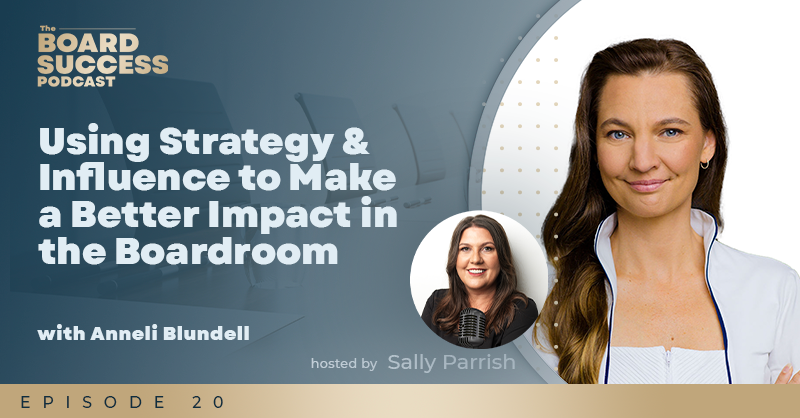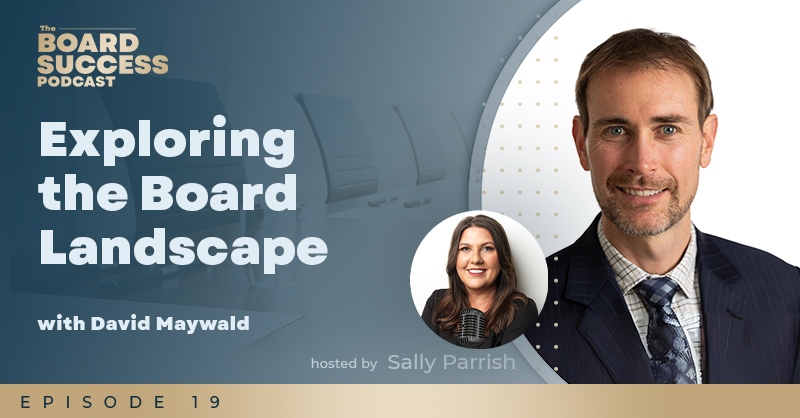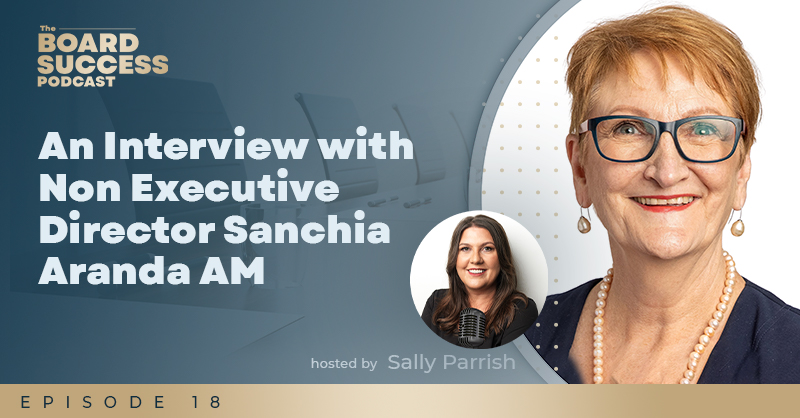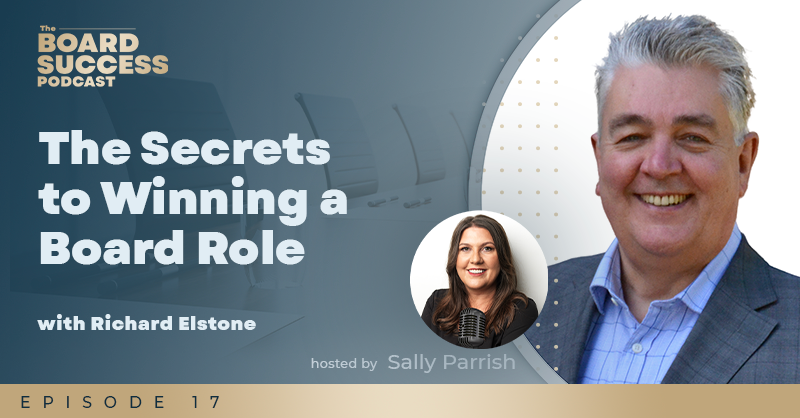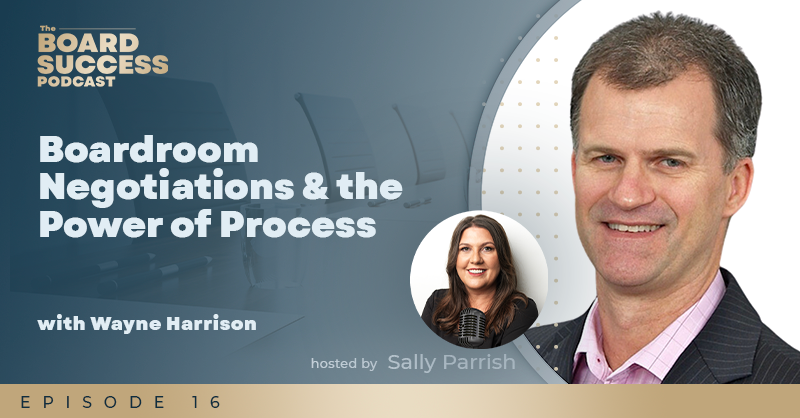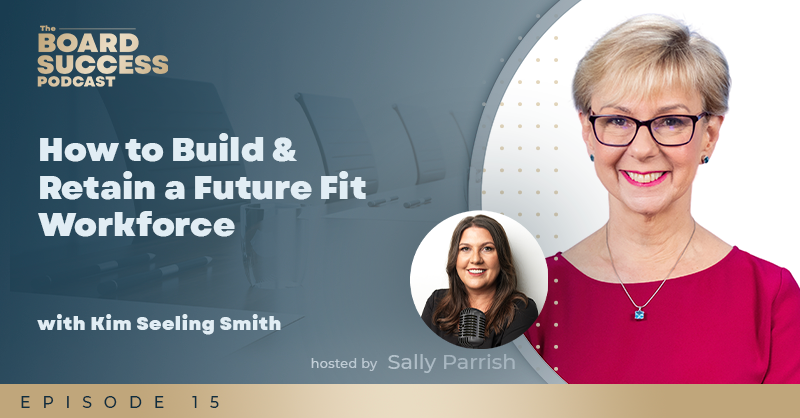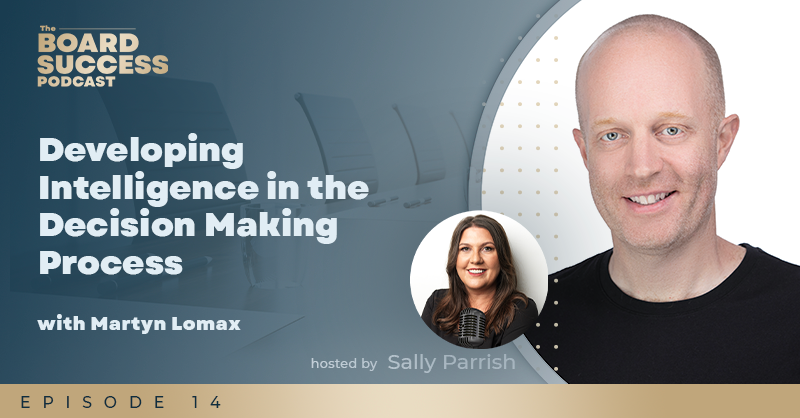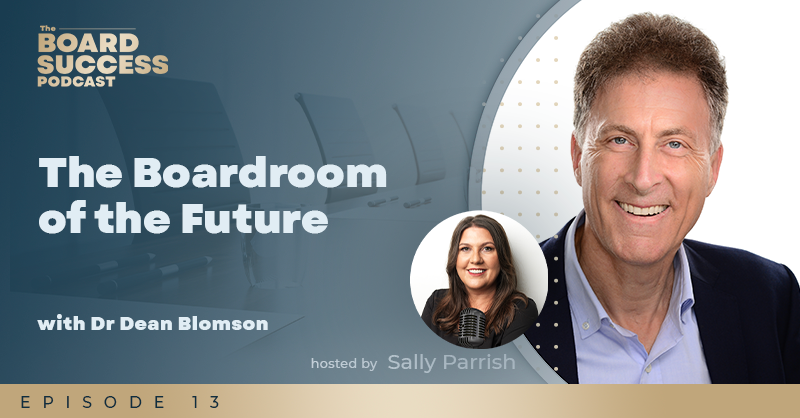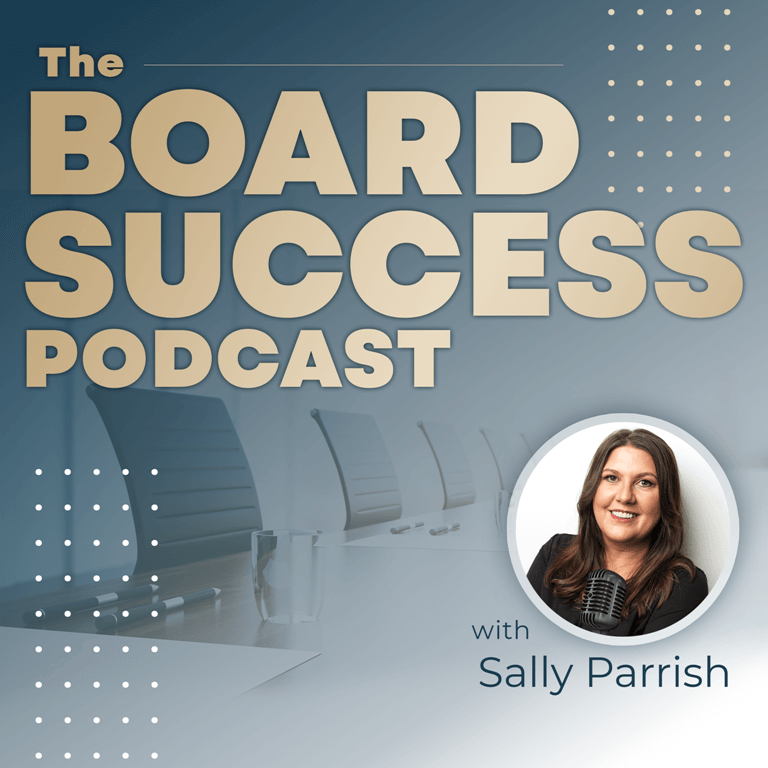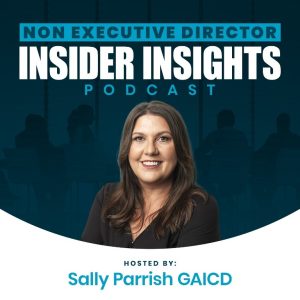Why Lisa Doesn't Want You To Know She Was A Lawyer with Lisa Chung AM
Sally Parrish interviews Lisa Chung AM
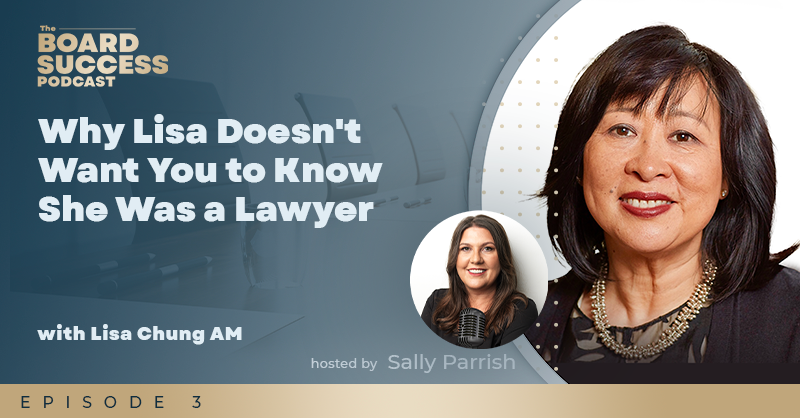
In this episode we bring you a favourite episode from our sister podcast, 'Non Executive Director Insider Insights'. In this podcast we interview NEDs to hear their stories and to learn from them. In this episode Lisa Chung AM, Chair of Australian Unity shares why she deliberately stopped practicing as a lawyer and how her passions and values have fuelled her board success.
At the time of this recording, Lisa's board portfolio included roles with AV Jennings Limited, Warren and Mahoney, the Committee for Sydney, the Sydney Community Foundation, Artspace/Visual Arts Centre Limited, The Front Project and the Trustee of the Foundation of the Art Gallery of NSW.
FURTHER INFORMATION
Meet Lisa on Linkedin https://www.linkedin.com/in/lisa-chung-am-47005225/
Click Here to View the Podcast Interview Transcript with Lisa Chung AM
Sally Parrish 00:01
Hi, I'm Sally Parrish, Amazon Best Selling Author of the essential Field Guide for company directors and founder of the board Coaching Institute. I've been in on and around boards for over 20 years. And if you like me are passionate about the boardroom, then this podcast is for you. And I'd love you to join me on this mission to decode board success. What is it that sets some non executive directors apart from the rest? How can you enhance your leadership skills so you can be highly effective in the boardroom? And what will it take to make board success reality for you. I hope you enjoy these episodes as much as I love making them and that they unlock the secrets for you to gain a competitive advantage and have massive impact and influence in your board roles. Let's get started. Have another podcast series. It's called the non Executive Director insider insight series. What a mouthful, that is, um, in that podcast, I interview directors on boards and I asked them to share their journeys with us. What I thought I'd do today is to provide an episode from that series on this podcast. So you can get some hints, tips, advice and ideas from somebody who's out there doing it. So I hope you enjoy this. Let's play the recording. Hello and welcome to Insider insights where you get to meet non executive directors and go inside their boardroom. Today we're joined by Lisa Chung, who will give her unique perspective of board life and offer up some hints and tips to help you to succeed too. Lisa is currently a non executive director at Australian unity limited AB German with limited Warren and Mahoney, the committee for Sydney, the Sydney Community Foundation, and art space dash Visual Art Center limited and she's also the chair of the front project and a trustee of the foundation of the Art Gallery of New South Wales. Lisa was a partner at law firms Maddock and Blake Dawson, who are now Asha us before launching her board career, and was recently awarded the Order of Australia for her service to the community. So join me now and let's hear from our insider Lisa Chang. Welcome, Lisa, thank you so much for joining us today for this episode.
Lisa Chung AM 02:33
It's a pleasure, Sally.
Sally Parrish 02:35
Now I must start by acknowledging since we caught up a couple of years ago, you've become a member of the General division of the Order of Australia. Congratulations on that. Lisa, I'm so thrilled for you to get that acknowledgement.
Lisa Chung AM 02:49
Thanks, Sally. It's a real honor.
Sally Parrish 02:51
And deservedly so significant service to the community through charitable and cultural organizations. And we'll be talking about that today, because a lot of your board portfolio is actually invested in those causes. So I'm really excited to hear about the balance that you have. To start off, can you tell us where you were before you began your board career? So what did your exact life look like to you? So
Lisa Chung AM 03:20
I spent 32 years as a practicing lawyer, including about seven or eight years of that in senior management roles. And as an elected member of the board of the firm I was at which at that time, most of my career was at Blake Dawson, now Ashurst. So it was through the sort of commercial legal path, building up expertise, and I worked in the commercial property and infrastructure space as my area of expertise. And then I think really importantly, I spent the seven or eight years on the board. And in senior management roles, which gave you particular insights, gave you particular gave me particular skills and experience that you obviously don't get necessarily when you're fully in practice. So I think those were the kind of key aspects of my career prior to starting as a board member.
Sally Parrish 04:20
And how did your first board role come about for you? Well, it's
Lisa Chung AM 04:25
an interesting path. I'd always been interested in a career outside the law after the law. And I look to be honest, I sometimes joke about this, but it's not really a joke. I spent most of my career in the law, thinking about what else to do. So I do that. But I guess I stayed in the law for as long as I did, because of the variety that I was able to, to have in my career, which I've talked about. But I guess it was a two prong thing. So there was that but also the fact that I was working a lot in the pro Bono's space when I was a practicing lawyer, and, you know, I was volunteering as well at a wonderful institution called loose place. Soon realizing that my, my contribution as a volunteer at Lou's place was not really the optimal for lose place, I was getting more out of it than they were. So then I really thought about, okay, how can I apply my expertise and what I can bring to benefit worthy organizations like lose place. So then I decided that maybe I should try offering that on boards in not for profit space. And I went on my first not for profit board through a relationship that I had with a with a very encouraging and wonderful mentor who's still mentor to me now, that actually didn't work out that well. And I resigned from that board, as did my mentor, who was also on that board, through a terrible board, board politics. So you learn a lot from those experiences. So that was a bit of a not a great start. But it didn't didn't deter me, I just knew that I had confidence that that was not how it was meant to be. And I should just step off. And then soon I went on another nonprofit board completely different. That was a disability organization that does wonderful work. But the board, politics were just beyond. And then I went on the board of the Australian Institute of Management through another contact, so through the network. And that was a brilliant experience. Because even though it was a not for profit, it was not paid. It was run like a commercial organization, it, as you probably know, has a lot of education, training programs that was really running those businesses, and of wonderfully, professional, very skilled board. And so I learned a lot from those board members in that first experience.
Sally Parrish 06:56
I love how you talk about some of the mistakes that you made earlier on on the boards that weren't right for you. One of the big pieces we talked about is alignment and due diligence. And that, you know, it's hard to get on a board. But it's really hard to get off of the wrong board. So is there anything that you learned in terms of how to find a good fit for future roles, or that due diligence pace, having gone through those boards that weren't right for you initially?
Lisa Chung AM 07:23
So it's only that one? And I have to say that it wasn't too painful? I mean, it was, it just became so political, that it was obvious that not everybody could and should stay. So it didn't create that much disruption, it wasn't a problem for me to step down as far as they were concerned, or as far as I was concerned. That's not always the case, of course. So the lesson in that one, and the lesson that I really give to people all the time is you have to do your due diligence, I did my due diligence, and that was all fine. But the probably one of the most important elements, that is hard to do when it's your first board. And you don't quite have the experience now it wouldn't be a problem at all. For me. Who's the chairman? And that was the crux of the issue. Yes. And if you're not comfortable with the chairman, and how the chairman operates or your rapport with them, even in the first meeting, I've had subsequent discussions with Chairman of other boards and thought, that's just definitely not the place for me. And you have to have the confidence.
Sally Parrish 08:35
Yeah. And it's all about personal fit. Yeah. And it's about personal fit. That's true, right? You've got to have that psychological safety in the boardroom to feel that you're valued to feel that you can ask the questions, and that starts with the chair. But also there's that, you know, that ego side and that emotional side where a lot, a lot of times we get flattered, we're offered board roles, and we get so flattered that we kind of turn a blind eye to some of those red flags. So for you meeting with the chair, is that in an informal capacity that you do that?
Lisa Chung AM 09:10
Well, I think most times when you're approached, other than if it's through a recruiter, your first meeting will be with the chair and potentially someone else. And sometimes, it's tempting, well, I don't always just say, shut it down or say straight afterwards. It's not for me, I think you do have to reflect and you do have to think about it sensibly. And but at the end of the day, you apply your mind, but also your heart to it. I love that. So you'd think about, you know, how do I feel after that? Is that someone who's leading a board that I want to be sitting at the table with? And quite often, you don't immediately sort of jump on your first impression, but often your first impression is right.
Sally Parrish 09:55
Yeah, that gut instinct counts for a lot, doesn't it? And I guess if there's a chair and another So you've got the interaction between those two people, as well. And that would give you a lot of insights to.
Lisa Chung AM 10:05
That's right. If it's not, it's not that's also another sign, as you say, sort of extending your point.
Sally Parrish 10:12
Yes, yes, how they interact between themselves. So you've got this fabulous football portfolio, I don't know that I've ever seen a more enviable board portfolio than you have right now you've got such a great diversity. There's such a really good spread here. So Australian unity, all about private health, you've got property development, architecture and design. There, we're looking at Sydney Community Foundation, which is all about grassroot charities in Sydney. But running alongside that is the committee for Sydney. And what a great group this is. So this is the peak advocacy. And it's an urban policy, think tank, how do you get involved in a in a group like that.
Lisa Chung AM 11:01
So it's largely through the sort of network of through different organizations that I've been engaged with. So obviously, it's to do with urban development. And its mission is what I love about the committee for Sydney is its mission, it's not for profit, its mission is to make Sydney the best city in the world to live and work in which to live and work. And it's not a lobby group. So it's not lobbying for a particular sector. It's really its mission really, is to do to do that. So it's through the fact that I've, you know, my background was as a commercial property, and infrastructure lawyer, I chaired the firm OBUS, I'm involved in, continue to be involved in the property sector on my boards, Australian unity, yes, it does have private health insurance, but it has a huge property portfolio as well. So property, it's not necessarily that I set out to pursue that. But obviously, when it's in your background like it is, it's something that you can bring along with the other skills.
Sally Parrish 12:12
So you're able to expand that now. Because you've got property as the skills and experience that that's your key experience, but able to build a board value proposition that emulates from that. So I guess the more the more projects you get involved in, the more context that you build, the more opportunities are available, and the more you have to offer to those.
Lisa Chung AM 12:35
Yeah, so obviously, originally, my main offering was as a lawyer in that sector. But now that I've chaired boards in the sector, I'm involved in the sector in a different way around for example, AV Jennings, which is, you know, a 90 year old company that it has always built quality, affordable homes for Australians, great brand, a very trusted brand, but it's in the sort of moderate residential housing space. So that's one lens that you bring the architecture for Warren and money, I just love the creative side of it. So I've sort of moved up the creative chain, if you like, from being a lawyer to then being in the urban design space and now into the architecture space. And it is an area of interest of mine, just in sort of connecting with you know, my because I also sit on arts boards, there's that connection as well.
Sally Parrish 13:28
Here, if I look at your portfolio, I can see a female, I always try and guess what people's board value propositions are or you know what their thing is. And when I look at yours, there's this common thread of being involved in things that you can create change in, so things where you can create improvement Betterment for the users of that business, but I'm gonna say making things sparkle, and I don't know how that's gonna land with a reformed lawyer. But it's kind of you know, the digital art making art available at early childhood, giving everyone a great start in life, making those children's sparkle, making Sydney the most livable city in the world making it sparkle.
Lisa Chung AM 14:11
Nobody's ever said that to me, Sally, but yeah, no, look, it's that I take that as a wonderful compliment, because I just find it. I find it such a privilege from where I started to being admitted into these arenas, where people are doing wonderful things, making change, making improvement with a particular purpose that I'm very aligned with, and, you know, admitting me into that arena to play a part in it. I mean, that's how I view it. And I never thought that I would ever have such opportunities, you know, going back say even 10 years.
Sally Parrish 14:53
Yeah, and I can see how that kind of, it's kind of like fuel in for your career because you you Get the enjoyment for it, you get the fun, I can see your face lighting up as you talk about these things. So you get the fun from doing it that energizes you that makes you passionate, your best self turns up, and then everyone's looking at least are on the boards. And she's so dedicated. You know, she's she's so committed to this space. And one thing kind of feels the other, I guess. Yeah,
Lisa Chung AM 15:21
I would never take a board that I wasn't fully committed to, and that I didn't want to really immerse myself in and do my best can't, you know, bring my best to that role. They're all part time, of course, but you can still bring your best and make your best contribution possible in those and that that I think is the is the reward that you get from being involved. I mean, I heard yesterday from somebody was talking about a board that they chair and sort of not necessarily having that level of commitment and engagement around the table. And I just think, okay, you need to put a bomb under them.
Sally Parrish 16:06
Yes, yes. I just I think there should be laws against it. There should be minimum engagement levels, that board level and if you don't meet them, you or the whole board are out yet, because you're doing a disservice. Lisa, can I move on to personal branding and reputation that's critical at board level to have a really solid reputation. And you've certainly, Manish at this brand, Lisa, now is absolutely incredible, you're getting invited to be a keynote speaker you're being invited to panels was that an intention on your part to develop your expert status and have more kind of profile in the industry
Lisa Chung AM 16:49
knows definitely not, that was not what I set out to do. That's not what I set out to do. Now. Look, it's a great honor to be asked to do many of these things. And I, when I can fit them in, I certainly do them as a way to to assist others or, you know, if people think that what I've got to say, as a value, then then I'm happy to do it. What I do is genuinely, I sort of think after 32 years as a lawyer, I'm now get to do the fun things. So I really just do things that are personally motivating or fun or interesting, or a learning opportunity or an opportunity to make a contribution that I think is valuable. I think that Latin one, the ability to make a contribution that people value is one of the best privileges that you can have. If you're able to do that. It's so personally satisfying to be able to, to make that kind of difference. That doesn't happen every day, of course. So no, I don't think about my brand or anything else, what you see is what you get. So you know that's gonna suit some people, and it's not gonna suit others, but I'm okay with that.
Sally Parrish 17:56
I love that you that you set your stall out and you stand for what you are, I always say it's about being authentic and having opinions because they won't always resonate with everyone, but they'll resonate with the right people, and you'll attract the right opportunities from that. And I know you shared earlier, your mantra is that you say yes to everything. So having that curiosity and that kind of curious mind to see where anything's going to take you.
Lisa Chung AM 18:26
Yeah, I think that's important. I think your point about authenticity. That's actually the starting point for everybody. I think it's so important to maintain authenticity, and just to be you. However, I also stress to people, particularly people who are finding it difficult to forge a path one way or another. Authenticity is absolutely the starting point. But you also have to find a way to how you're going to evolve, and how you wonder would adapt to meet your goals. So always stay true to yourself. But that doesn't mean you can't change, evolve, adapt.
Sally Parrish 19:07
Yeah, I love that. So the audience today, our senior executives are very much looking to transition into the board space looking for their very first paid board role. So a lot of these have done not for profit work. They've done the board facing work in their current roles. Can we talk about advice and tips that you would have for them starting out so if we could segment them possibly let's start with the lawyers and the financial people because they used to have a rite of passage? I think it used to be a lot easier for them, but it's much more difficult for them nowadays, isn't it?
Lisa Chung AM 19:47
Yes, it is. I think for all directors it is a much more difficult path. So traditionally, people finish their executive careers in one of those areas or in other even and then expected to get on boards. I mean, you hear men, for example, saying now it's very hard for men to get positions on boards. Actually, that's statistically not true. Just need to dig the statistics out. It's harder than it used to be sure, yes. So what I would say is that you really need I mean, I think it's much, it's easy to say, but it's actually much harder to do in terms of making that transition from an executive role, whether it says a lawyer or any other kind of full time executive role to making yourself suitable to be a board director, you actually have to completely turn yourself inside out almost, to create a completely new perspective as to what your role is, and what your experience is, as an executive is a foundational part of the next career if you want to choose directorships. But it's got to be so much more than that. So you've actually got to be able to articulate how that experience and expertise translates to value to a board. And that will be different in everybody's case. So don't come to a board saying, Well, I was a lawyer for 32 years. And I mean, I don't, personally I don't want to, I don't want to sit on a board and be a lawyer, and neither does anyone else either want me to be, and it would be absolutely dangerous for me to be giving advice, I don't even have a practising certificate anymore. So I really don't consider myself a lawyer anymore. Finally, some people don't even know that I was a lawyer, which is always surprising to me. So you've really got to, it's harder than than it sounds to make that transition, no matter whether you're a lawyer or something else. So you've got to think about how that translates. And then you've got to think about what other value adds you bring.
Sally Parrish 22:04
So lead in with the exact skill set that you have as a foundation or a basis, having a directors mindset and understanding how that's going to translate at board level. One of the things we always talk about is negative perceptions. You know, if you're a lawyer, you're going to get into the detail in the clauses of the contract. If you're a finance guy, you're gonna get into the notes and assumptions on page 72, of the financial report. So being really clear that you understand the the level of engagement that this is oversight, that this is not execution, but strategic direction. So I always say about addressing the negative perceptions. But I love how you say how it translates to value. If you're in that chair role, or you're, you're on a board, or you're considering new entrants, what are some of the reservations that you would have about bringing somebody on that doesn't have any board experience?
Lisa Chung AM 23:06
Look, it depends on what board it is and what you're actually looking for. But if if you're talking about a sort of a commercial board, where you're looking for a particular set of skills, you've got a fairly sophisticated role description about the skills and expertise you're looking for. It's become a much more complex exercise, I have to say, yesterday, I was actually at a non executive directors forum at PwC, we were talking about issues around climate change. But the conversation at one point turned to the complexity of being a director these days is a lot higher than and the path is less defined, as you have already pointed out, Sally. So for example, when I'm in sort of recruitment mode on a board, we have a very sort of detailed role description about skills, etc, that we're looking for. But that's actually only I sort of look at that, and I obviously, assess that with the candidates. But then I've got a whole list of other things that I'm looking for. And I can share that with you. So, you know, obviously, do they have any conflicts? Or can you see potential conflicts down the road? That's a fairly standard thing, really assessing the purpose and values and the alignment with the organization, as well as with the board, I guess, whether or not their personal style is going to be complementary, meaning not the same, but it's going to work for the team. That is the board. A really critical element today of a board director, is their intellectual rigor and in particular, their curiosity. So that board that stopped performing that I talked about, it's just not a curious board. You can't have that these days. You've got they've got to be flexible and deal with ambiguity and uncertainty in today's world. So they need to be able to go high and low. And then I always say, what other extra thing? Can they bring? The special sauce? Yeah, something extra. And that's the precise The X
Sally Parrish 25:19
Factor. So you've got, you know, you've got a candidate with a certain background, expertise and experience, but they have a passion for this thing that you're doing at board level, or they've done something significant in their life around this area, I always encourage my clients to really bring their personalities into their board resumes, you know, so if, for example, in my current client base, we've got rocket scientists and boating enthusiasts, and you know, that's part of who you are. And that's going to add a lot of value to the right board. So lead lead with that, and let people see the real use so many resumes now are very vanilla. You know, I'm a strategic thinker, and blah, blah, blah, blah, well, so you should be right. So you should be.
Lisa Chung AM 26:05
What does that even mean? I mean, yeah, it is it is this question. Who are you? Actually, I'll tell you the last question that I always ask when I'm thinking about a board, please do? Does the board have a sense of humor? Oh, I love that. So I'm not interested in boards that don't have a sense of humor.
Sally Parrish 26:23
And there are boards out there that are very, very stuffy. I'm very playful, too. One of my values is fun. And that would be really important to me, but I'd never actually thought about having fun at board level. But I mean, it's crucial, isn't it? It's critical? Yeah, well, I'm
Lisa Chung AM 26:42
on eight boards, if I'm not having fun. It's gonna be pretty dull.
Sally Parrish 26:49
Do you know what your other values are? So having fun at board level, would you be able to articulate some other values? You said authenticity earlier?
Lisa Chung AM 26:57
I think commitment. So when I commit to something I really am fully in. Yes. So I'm not a half in person. Yes. All in my kids will attest to that. I've always stressed that with them. I think I'm a pretty straight talker. Some people find the direct talk, I tried to be as diplomatic as possible. But I think a lot of people find direct talk quite confronting. So other people like it. But you know, that's, I don't know, any other way. And I think it's more efficient to be a direct talker than beat around the bush. Yeah,
Sally Parrish 27:41
direct talkers, often are busy people. I know, if I'm running big events, I need to say to the team at the beginning of the day, I love you very much. That might not be apparent in my actions today. But I do love you very much. And I think just having that that human side where people know that you value them. And you know, I just I just want to get my point across. And that's the key to robust discussions that you can say what you think, but not damage the relationships or not burn in the relationships as you do that? Yes, so
Lisa Chung AM 28:15
the word relationship, I am a very relationship focused person. So I maintain relationships from 30 years ago, those ones you know, the ones particular that you value. So I think people always tell you're very good at keeping in touch or whatever. The relationship is a really important aspect of any role that I'm engaged in. Yeah, I see huge value in relationships for their own sake, not for any other purpose, necessarily. I love that you
Sally Parrish 28:50
go about your board career, doing the things you enjoy having fun, building relationships, because they're important to you. Just being curious, I love I love that you've developed your board career. In that way. It's really refreshing. You know, a lot of times when we do these interviews, the advice is very kind of, you know, you're gonna do your AICD. And then you go and do this, and you go and do that. But I love that you are really reflecting on your experience, because I think that's so valuable to people starting out. If you were going to mentor a senior exec looking for their very first paid board role. What is some of the things that you would be helping guide in or coach them through over the first 12 months working together?
Lisa Chung AM 29:37
Well, I think the first thing if they were looking to transition, perhaps to board directorships, and I say I emphasize perhaps because I think my journey was not one where I assumed that this was the right thing for me. I tested it out and, you know, we've already covered that and you know, first one didn't go so well, but I could see that was that there was a pathway there, and I continued to explore it. So I think that I would encourage people to really look back on their executive career. And think about what it is that they found fulfilling in that, that they enjoyed in that. And then work with them to really think about why they might want to pursue a board career. Because there are other options as well. I think a lot of people just assume that that's the next thing. without really understanding what it would mean, what they would need to bring, what learning they might need to do in between AICD course is obviously important. But there's a lot beyond that. A lot of people don't realize how important the network is to it. And even though you may be listed by recruiters, you know, that recruiters may be impressed with your CV quite often, it's actually even difficult to get a recruiters attention, because they're inundated with calls from people who want to be on boards. So finding that pathway is is something that I do help people with understanding how it translates, as we talked about already, and then really testing how they want to embark on that. Building a network is actually really time consuming takes five to 10 years to actually have a meaningful Yeah, absolutely proper network and network. When I'm talking about a network, I don't mean just giving up business cards at a sort of stand up cocktail function. It's actually about meaningful relationships.
Sally Parrish 31:52
Yeah, that Rolodex that's not going to serve any purpose right now. It's, I think it's having real people as well as people, you can vent to people you can trust, where you can voice concerns or issues. And those are the types of relationships that will really serve you at board level. coming to a close now. So Just two very quick questions. What do you think the biggest challenge is of being a non Executive Director?
Lisa Chung AM 32:22
I think at the moment, it's the changing pace of life. And the, it's such a different environment now. So here we are running behind on how we deal with climate, and how that translates to your role as a director on a board. The geopolitical uncertainty in the world, there's just so much uncertainty, the next 10 years are going to be nothing like the last 10 years. So coming to a board with I've had this wonderful executive career, that's only going to get you so far, because the next 10 years is going to be so different to possibly anything anyone's ever known. And you have to be prepared for that. If you're sitting on a board, you know, you're really steering the company around that. So I think the ability to deal with uncertainty, incomplete information, ambiguity, and feel comfortable leaning into that, that ambiguity
Sally Parrish 33:21
keeps coming through. That's the only consistent I'm seeing right now is that there is so much ambiguity at board level. And when we're dealing with really big things. Now, it used to be, you know, the profit and the strategy and the governance, but now it's the cybersecurity and the wellness and the ESG. And, and they're really, really big topics in their own right.
Lisa Chung AM 33:43
Yeah, very big. So in the span of your purview, your responsibility is much wider. I mean, it was interesting when the issues of say gender, and in particular sexual harassment in corporates came has come up. And having had quite a lot of exposure to issues like that over the years, and being a sort of senior woman executive, you might you may have dealt with it more. And you assume that everyone else, you always assume that other people know what you know, but actually, I found that there was such a gap in understanding and willingness and ability to lean into that and deal with that at board level. So there's a lot of new stuff that people have to get their head around.
Sally Parrish 34:31
Yeah, and rightly so. You know, it's about time for some of these topics that they they did reach the board table. Lisa, final question. What's your big tip for anybody starting out today?
Lisa Chung AM 34:44
As a board director, follow your true self. So often people get advice that they should go on a not for profit board to get experience. As a chair of not for profit boards. That's the last thing I want on my board. So that's a piece of advice.
Sally Parrish 34:59
Thank you for saying that because it's such a disservice to those boards. Yeah. When you're just there to further your resume.
Lisa Chung AM 35:08
Yeah, no, that's not happening on Piper woods. Yes. So find your passion. It could be commercial board, it could be a not for profit board do not come to talk to anyone unless you've got a genuine passion, interest. clarity about what contribution you can make.
Sally Parrish 35:26
Yeah. And that needs to be a burning passion now to cut through all that noise. Right? Everybody's out there. And they're passionate and they want to add value. But yeah, you know, Shine sparkle, show me that demonstrate that leave me with a great impression so that I remember you when a vacancy comes up, or when I'm shortlisted. And stand out be different. I love I love find your passion.
Lisa Chung AM 35:48
Yeah, but do your homework. So what you know about yourself and your passion and everything? That's only one side of the equation? It's okay. Does it actually match what we need in the organization? That's two sides of the same coin. And they both have to match. Yeah.
Sally Parrish 36:03
And how many people turn that for interviews and don't even know who's on the board or what the strategy is right now. And they get rolled out pretty fast, don't they? Yeah, they do. Lisa, I could speak to you for hours and hours and hours. And I'm aware that you are incredibly busy. So I want to thank you so much for your time today. And the generosity of your insights that you've shared today. It's been really great catching up. Thank you so much for joining us.
Lisa Chung AM 36:32
Not at all, Sally. Thank you, and it's been a great conversation.
Sally Parrish 36:40
Thanks very much for tuning in. I'd love to know what you thought of this episode and what you took away from it. I'd also love to know what topics you're interested in hearing about in the future, and which experts you think should be featured on their sports success podcast. If you enjoyed listening, please share with your colleagues who might also have an interest and make sure you click to follow us subscribe to be advised about an upcoming episode. In the meantime, if you're a leader or a successful executive, and you're looking to launch your board career, or if you're an established non Executive Director, and you're ready for the next level, check out the resources we have available for you on the website at board coaching institute.com.au. Until next time, here's to your board.
Explore more episodes
